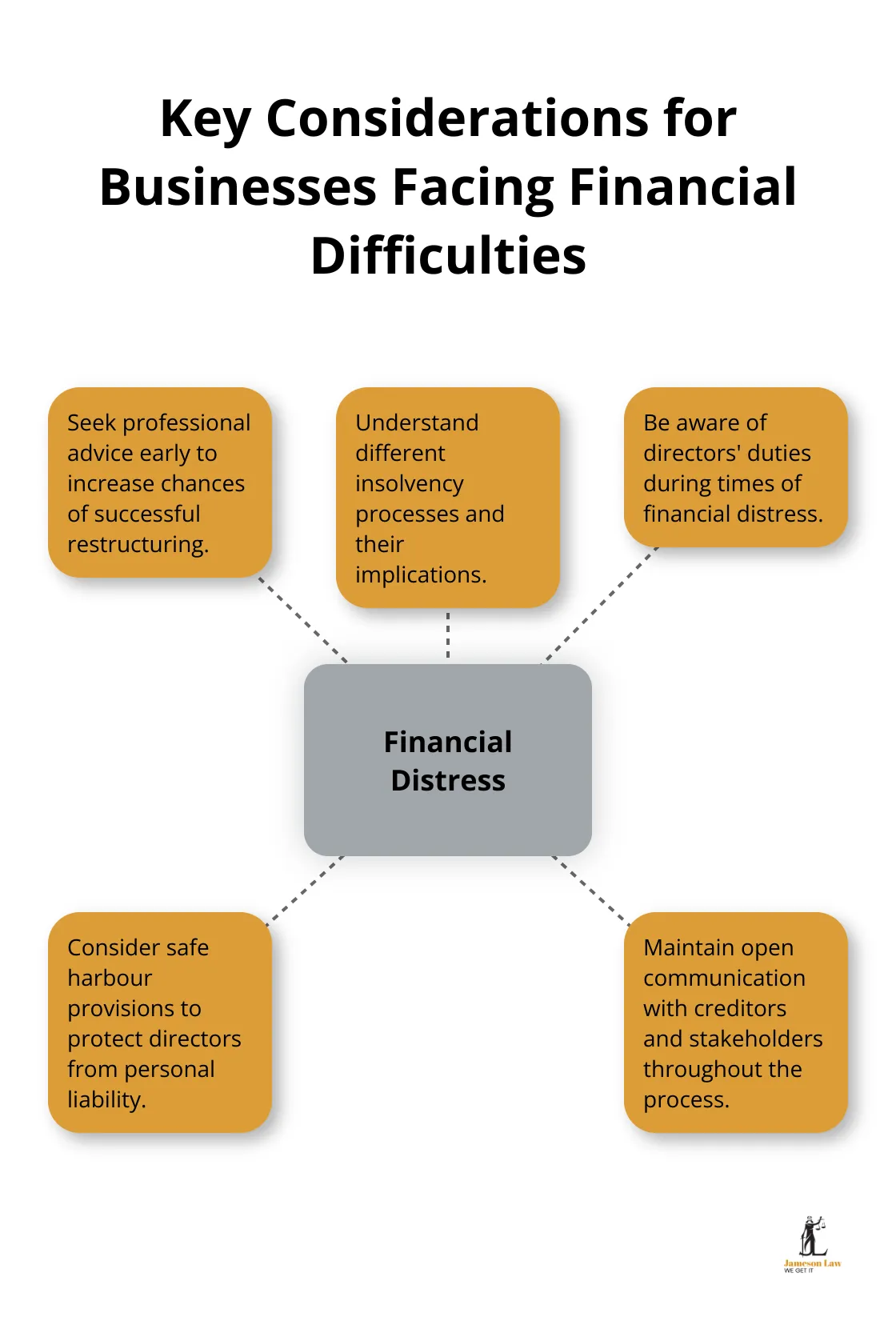Corporate and commercial law forms the backbone of business operations in Australia. These legal frameworks govern everything from company structures to contractual obligations and consumer protections.
At Jameson Law, we understand the complexities businesses face when navigating this legal landscape. This comprehensive guide will explore key aspects of corporate and commercial law, providing valuable insights for Australian businesses.
How Corporate Law Shapes Australian Businesses
Corporate law in Australia forms a complex network of regulations that dictates how businesses operate, from small startups to large corporations. This legal framework aims to protect stakeholders, ensure transparency, and promote fair business practices.
The Corporations Act 2001: Cornerstone of Corporate Governance
The Corporations Act 2001 stands as the primary legislation governing corporate entities in Australia. This Act outlines the rules for company formation, operation, and dissolution. It’s not merely a set of guidelines; it’s a mandatory framework that all Australian companies must adhere to.
One of the Act’s key provisions requires companies to establish a clear governance structure. This includes the appointment of directors, regular meeting schedules, and maintenance of accurate financial records. For instance, the Act mandates that public companies must hold an Annual General Meeting (AGM) within five months after the end of their financial year.
ASIC: Australia’s Corporate Watchdog
The Australian Securities and Investments Commission (ASIC) serves as the primary regulatory body overseeing corporate compliance. ASIC wields broad powers to investigate and penalise companies that breach corporate law.
In the 2021-2022 financial year, ASIC reported 313 criminal charges laid, which resulted in 201 criminal convictions. These figures underscore the serious consequences of non-compliance with corporate regulations.

Directors and Shareholders: Rights and Responsibilities
Directors shoulder significant responsibilities under Australian corporate law. They must act in the company’s best interests, exercise due care and diligence, and avoid conflicts of interest. The consequences of breaching these duties can be severe.
Shareholders, conversely, enjoy rights protected by law. These include voting on major company decisions, receiving dividends, and accessing company information. The Corporations Act 2001 also provides mechanisms for shareholders to take action against directors who fail in their duties.
Practical Tips for Corporate Compliance
- Regular Board Meetings: Companies should hold board meetings at least quarterly to review performance and compliance.
- Annual Compliance Calendar: Businesses should create a calendar marking key dates for financial reporting, AGMs, and other statutory obligations.
- Director Training: Companies should invest in ongoing training for directors to keep them updated on their legal responsibilities.
- Shareholder Communication: Establishing clear channels for shareholder communication ensures transparency and trust.
- Professional Advice: Engaging with legal professionals who specialise in corporate law can provide tailored advice on corporate governance and compliance issues.
As we move forward, it’s important to understand how these corporate law principles intersect with commercial law in day-to-day business operations. Let’s explore the essential aspects of commercial law that Australian businesses need to navigate.
How Commercial Law Impacts Australian Businesses
Commercial law forms the backbone of business operations in Australia. It governs the relationships between businesses, their customers, and other stakeholders. Understanding its key components is essential for any business owner or manager.
The Power of Contracts in Business Transactions
Contracts are the foundation of commercial relationships. In Australia, contract law primarily relies on common law principles, with some statutory modifications. A well-drafted contract protects your business interests and provides clarity in case of disputes.
A 2022 survey by the Australian Small Business and Family Enterprise Ombudsman revealed that 54% of small businesses experienced contract-related issues in the past year. This statistic underscores the importance of getting contracts right.

To avoid common pitfalls, consider these practical tips:
- Put all agreements in writing, no matter how small the transaction.
- Use clear, unambiguous language to prevent misinterpretations.
- Include specific terms for payment, delivery, and dispute resolution.
- Review and update your standard contracts regularly to reflect changes in your business or the law.
Navigating Consumer Protection Laws
The Australian Consumer Law (ACL) sets out a comprehensive framework for consumer protection. It applies to all businesses and covers areas such as misleading conduct, consumer guarantees, and unfair contract terms.
In the 2021-2022 financial year, the Australian Competition and Consumer Commission (ACCC) secured substantial penalties for breaches of the ACL. This highlights the serious consequences of non-compliance.
To stay on the right side of consumer law:
- Ensure your advertising and marketing materials are accurate and not misleading.
- Provide clear information about warranties and returns policies.
- Train your staff on consumer rights and your business’s obligations.
- Implement a robust complaint handling process.
Protecting Your Intellectual Property
Intellectual property (IP) often represents a business’s most valuable asset. In Australia, IP rights receive protection through patents, trade marks, designs, and copyright.
IP Australia reported a 15% increase in trade mark applications in 2022, indicating growing awareness of IP protection among Australian businesses.
To safeguard your intellectual property:
- Conduct thorough searches before applying for IP protection to avoid infringing on existing rights.
- Register your trade marks and designs as early as possible.
- Use confidentiality agreements when sharing sensitive information with partners or employees.
- Audit your IP portfolio regularly to ensure all valuable assets receive protection.
The Role of Legal Professionals in Commercial Law
The legal landscape is complex and ever-changing. Many businesses turn to experienced legal professionals for guidance. Legal experts provide tailored advice on all aspects of commercial law, helping businesses navigate legal challenges and seize opportunities for growth.
As businesses continue to evolve in response to technological advancements and changing market conditions, the intersection of corporate and commercial law becomes increasingly important. Let’s explore how these two areas of law interact and the legal challenges businesses face in mergers, acquisitions, and dispute resolution.
Navigating Complex Legal Challenges in Business
Corporate and commercial law intersect in complex ways, particularly when businesses face significant changes or challenges. These situations often require expert legal guidance to navigate successfully.
Mergers and Acquisitions: A Legal Minefield
Mergers and acquisitions (M&A) are complex transactions that require careful legal consideration. In Australia, the Corporations Act 2001 governs M&A activity, with oversight from the Australian Securities and Investments Commission (ASIC) and the Australian Competition and Consumer Commission (ACCC). This key piece of legislation outlines the rules for how companies are created, operate, and wind up.
Due diligence is a primary legal consideration in M&A transactions. This process involves a thorough investigation of the target company’s financial, legal, and operational status.
To mitigate risks associated with M&A transactions:
- Engage experienced legal counsel early in the process.
- Conduct thorough due diligence (including review of contracts, intellectual property, and potential liabilities).
- Ensure compliance with competition law, particularly if the merger could result in a substantial lessening of competition in the market.
- Consider the tax implications of the transaction structure.
- Draft clear and comprehensive transaction documents, including purchase agreements and shareholder agreements.
Effective Dispute Resolution Strategies
Disputes are an unfortunate reality in business. However, effective dispute resolution strategies can help minimise their impact and preserve business relationships.
Alternative dispute resolution (ADR) methods are increasingly popular in Australia. These methods allow businesses to resolve disputes outside the courtroom and are typically faster.
Key strategies for effective dispute resolution include:
- Include well-drafted dispute resolution clauses in all contracts.
- Consider mediation or arbitration before resorting to litigation.
- Maintain clear communication channels with all parties involved.
- Document all aspects of the dispute and potential resolution attempts.
- Seek expert legal advice to understand your rights and obligations.
Navigating Insolvency and Restructuring
Economic challenges can lead businesses to face insolvency or require restructuring. The Corporations Act 2001 provides several options for businesses in financial distress, including voluntary administration, receivership, and liquidation.
Key considerations for businesses facing financial difficulties:
- Seek professional advice early. Early intervention can increase the chances of successful restructuring.
- Understand the different insolvency processes and their implications.
- Be aware of directors’ duties during times of financial distress. Directors can be personally liable for company debts and penalties if they breach their duties.
- Consider safe harbour provisions, which can protect directors from personal liability while attempting to restructure the company.
- Maintain open communication with creditors and stakeholders throughout the process.

Final Thoughts
Corporate and commercial law shapes business operations in Australia. These legal frameworks govern company formation, conduct, and compliance with regulations set by bodies like ASIC. Understanding these laws proves essential for business success and adherence to legal requirements.
Commercial law impacts contract negotiations, consumer protection, and intellectual property rights. Complex challenges such as mergers, acquisitions, and dispute resolution require careful navigation of legal requirements. Professional legal advice becomes indispensable in these situations to avoid costly mistakes and ensure compliance.
Jameson Law offers comprehensive legal services in corporate and commercial law. Our experienced team provides tailored support to help businesses address legal challenges and support growth. We stand ready to assist you with your legal needs and guide you through the complexities of the Australian business landscape.













